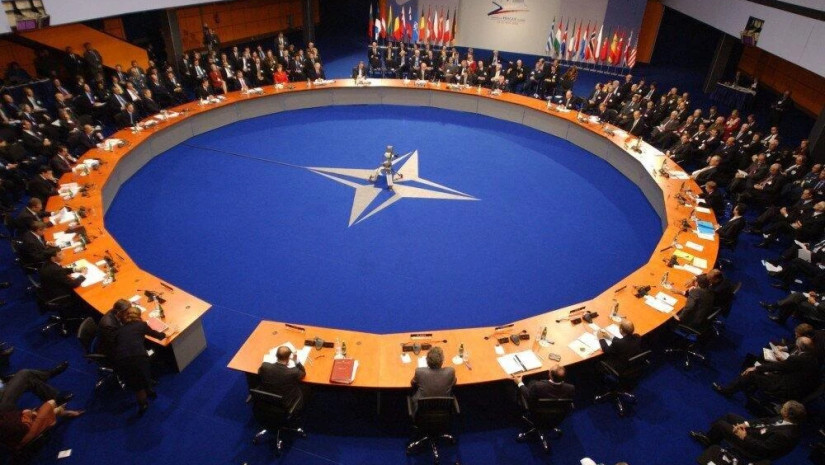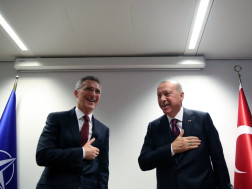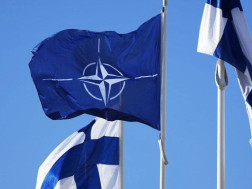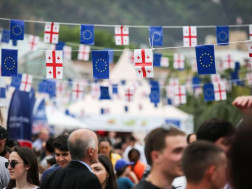Apart from Ukraine, Moldova has been hit hardest by Russia’s invasion of its neighbor, the Moldovan foreign minister said Wednesday, as NATO offered fresh support to three countries shaken by the effects of Moscow’s 10-month-old war.
Nicu Popescu told The Associated Press in an interview in Romania’s capital that “we want to be expanding our cooperation with partners who support Moldova ... that includes the European Union (and) NATO.”
That support for Moldova — as well as Georgia and Bosnia — came from NATO allies also on Wednesday when the three countries’ foreign ministers met with their NATO counterparts to discuss how the world’s biggest security organization could help them in the face of political, energy and territorial uncertainty precipitated by the war.
NATO Secretary-General Jens Stoltenberg said after talks that the allies discussed shared security concerns with the three countries which he said are facing Russian pressure. Stoltenberg said alliance members agreed to help train and improve the three nations’ security and defense institutions.
“If there is one lesson learned from Ukraine it’s that we need to support them now ... when we have seen developments going in the absolutely wrong direction as we saw with the invasion of Ukraine,” Stoltenberg said at the Palace of the Parliament in Bucharest.
Russia’s war in Ukraine has had a particularly troubling effect on Moldova, Ukraine’s neighbor, which is currently facing a severe energy crisis due to its reliance on Russian imports.
In recent weeks it has suffered massive power outages as a result of Russian strikes on Ukraine’s energy grid. Moldova’s Soviet-era energy systems remain interconnected with Ukraine, which is why the Russian missile barrage caused the lights to go out.
Russian missiles have also traversed Moldova’s skies, missile debris has landed on its soil, and in April blasts occurred in the country’s Russian-backed breakaway region of Transnistria — where Moscow bases around 1,500 troops.
“Every week there is something new, there’s a new negative effect of this war on us,” Popescu said. “Last week ... almost 80-90% of the country was plunged into darkness for most of a day. This is a really, totally unacceptable, very aggressive Russian campaign that targets Ukraine but also in complete disregard of our security.”
Moldova was granted EU candidate status in June, the same day as Ukraine, and is constitutionally neutral, but “neutrality does not mean demilitarization, we need the military means and all the other means to defend our country, to defend our peace, to defend our people from aggression,” Popescu added.
Stoltenberg told reporters on Wednesday that Bosnia — which has long been wracked by political instability, Russian interference, and ethnic tensions — is “important for stability in the whole of the Western Balkans.” Protests rocked the Bosnian Serb half of the ethnically divided country last month after some voters alleged that a pro-Russian Bosnian Serb leader rigged an election in the Serb entity, Republika Srpska.
Bosnian Foreign Minister Bisera Turkovic said her country, where a government is in the process of being formed following the elections, “is very concerned about the future.”
“We have proxies, or we had the proxies, in our government, Russian proxies. So division in the country is deep and we hope that we will be able to overcome it. NATO’s presence is extremely important for Bosnia-Herzegovina because it is a guarantor of our security,” she said.
NATO has promised Georgia that, like Ukraine, it will join the 30-nation alliance one day, but Russian troops swept into Georgia after that pledge was made 14 years ago. A breakaway Georgian region has this year threatened to hold a referendum on joining Russia.
An international aid conference in Paris last week co-chaired by France, Germany and Romania raised more than 100 million euros ($103 million) to support Moldova, Europe’s poorest country. Earlier this month, the EU also pledged the country 250 million euros (nearly $258 million) in aid.
“We are working with all the partners ... and that is helping us,” Popescu said Wednesday. “At the same time, the truth is that between now and April (we) still have quite a lot to go in ensuring that we’ll be having an uninterrupted supply of gas and electricity,” AP reports.
















